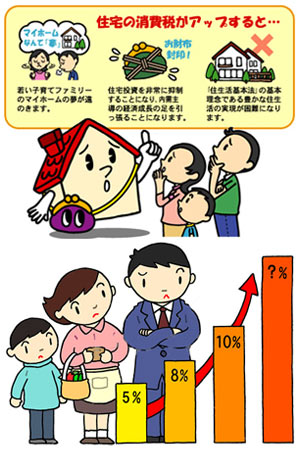In 1989 Japan enacted its first consumption tax (e.g. VAT or sales tax), forcing a 3% tax on purchases on a loudly complaining populace, and in 1997 the rate was raised to 5%. Now after years of wrangling by Japanese politicians, the tax is slated to be raised to 8% next April, which will likely cause more wringing of hands by consumers here. (Depending on where you live in the world, you might feel it’s “quaint” to get upset over an 8% VAT, of course.) While there’s a long list of products exempted from California’s sales tax (essentials such as food, medicine, etc.), Japan’s consumption tax is charged to nearly everything, all food, educational materials, even land and home purchases, which means there’s always a big rush to finalize real estate purchases before a tax increase, followed by a big drop afterwards. The tax rate is scheduled to go up to 10% in another two years, too, though hopefully the ruling Liberal Democratic Party will wait for a rise in wages before they follow through with that. More than the increase in consumption tax to 8% is the nervousness the move is making people feel about the future. Japan is unique among industrialized nations in that there’s very little permanent immigration from the outside compared with the U.S. and Europe. Coupled with the low birth rate of just 1.39 children per female, this means Japan has greater financial challenges thanks to fewer young people supporting a rapidly aging society. (Japan is quite envious of the U.S., with its near-2.0 births per female and plenty of incoming immigration.) Internationally famous director and comedian Beat Takeshi hosted an interesting TV show in which politicians and scholars were given the opportunity to suggest strategies to tackle Japan’s growing public debt. One suggestion was a “death consumption tax,” with the reasoning being that if a person uses money during his life he’s paying taxes and contributing to society, but if he saves his money without spending it society isn’t benefited, so upon his death let’s take a portion of that as consumption tax. While the aging of Japan is a big issue, another part of the problem is Japan’s worthless leadership Japan over the years, with politicians addicted to building Shinkansen lines to Hokkaido and a “tunnel to nowhere” across Tokyo bay for no reason other than economic stimulus. Over the summer Japan’s national debt passed 1,000,000,000,000,000 yen (one quadrillion yen, around $10 trillion), which is twice Japan’s current GDP. When Google Calculator translates your country’s national debt into scientific notation, things can’t be good.

There’s concern over the coming rise in consumption tax.














